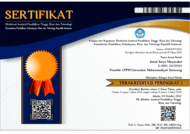Pelatihan Literasi Digital Guru SD & MI Al Hikmah untuk Menciptakan Pembelajaran Aktif
(1) Universitas Muhammadiyah Semarang
(2) Universitas Muhammadiyah Semarang
(3) Universitas Muhammadiyah Semarang
(4) Universitas Muhammadiyah Semarang
(5) Universitas Muhammadiyah Semarang
(6) Universitas Muhammadiyah Semarang
(7) Universitas Muhammadiyah Semarang
(8) Universitas Muhammadiyah Semarang
(9) Universitas Muhammadiyah Semarang
(10) Universitas Muhammadiyah Semarang
(11) Universitas Muhammadiyah Semarang
(12) Universitas Muhammadiyah Semarang
(13) Universitas Muhammadiyah Semarang
(*) Corresponding Author
Abstract
The impact of the Covid-19 pandemic on the education system has altered from face-to-face learning to online learning. The sudden pandemic made teachers underprepared either psychologically or pedagogically to teach online learning. Many teachers often faced psychological pressure while preparing for online teaching due to the lack of digital literacy. Teachers now have to overcome pressures for understanding digital literacy. Teachers have issues with: 1) the lack of digital literacy mastery and/or the utilization of digital learning platforms, and 2) the lack of teachers’ ability in creating meaningful learning through the use of digital technology and/or interactive multimedia. By providing the 33 teachers with support and training in digital literacy, those issues could be resolved. The assistance is focused on how to use digital learning platforms and produce android learning and interactive multimedia videos to support the learning process in the classroom. The findings showed that teachers are becoming more knowledgeable about digital literacy, particularly as it relates to the utilization of digital learning platforms and the creation of android learning videos and interactive multimedia learning videos to support the learning process in the classroom. Through the use of digital learning platforms in the classroom, teachers can provide meaningful learning experiences to students and students can actively engage in the learning process. In addition, digital literacy helps teachers increase students’ enthusiasm in the classroom, and students’ autonomous learning.
Keywords
Full Text:
PDFReferences
Aimah, S., Rukmini, D., Saleh, M., & Bharati, D. A. L. (2020). Microteaching guided by an expert secondary english teacher: The effect on pre-service english teachers’ pedagogical content knowledge. Pedagogika, 139(3), 111–135. https://doi.org/10.15823/p.2020.139.6
Bawden, D. (2001). Information and digital literacies: A review of concepts. Journal of Documentation, 57(2), 218–259. https://doi.org/10.1108/EUM0000000007083
Borthwick, A. C., & Hansen, R. (2017). Digital Literacy in Teacher Education: Are Teacher Educators Competent? Journal of Digital Learning in Teacher Education, 33(2), 46–48. https://doi.org/10.1080/21532974.2017.1291249
Cabero, J., & Barroso, J. (2016). Cultura y Educación ICT teacher training : a view of the TPACK model / Formación del profesorado en TIC : una visión del modelo TPACK. Cultura y Educación, 28(3), 633–663. https://doi.org/10.1080/11356405.2016.1203526
Gilster, P., & Glister, P. (1997). Digital literacy. Wiley Computer Pub.
Mishra, P., & Koehler, M. J. (2006). Technological Pedagogical Content Knowledge: A Framework for Teacher Knowledge. Teachers College Record: The Voice of Scholarship in Education, 108(6), 1017–1054. https://doi.org/10.1177/016146810610800610
Mulyadi, D., Wijayatiningsih, T. D., Budiastuti, R. E., Ifadah, M., & Aimah, S. (2020). Technological pedagogical and content knowledge of ESP teachers in blended learning format. International Journal of Emerging Technologies in Learning, 15(6), 126–139. https://doi.org/10.3991/ijet.v15i06.11490
Nguyen, X. T. T. (2014). Switching on to digital literacy? A case study of English language teachers at a Vietnamese university. An unpublished thesis in partial fulfilment of the requirements for the degree of Master of Education, Unitec Institute of Technology.
Nurhayati, S., Masri, A., & Falah, N. (2020). Implementasi Workshop Literasi Digital Dalam. JMM (Jurnal Masyarakat Mandiri), 4(3), 348–359. http://journal.ummat.ac.id/index.php/jmm/article/view/2457
Payton, S., & Hague, C. (2010). Digital literacy in practice: Case studies of primary and secondary classrooms. Futurelab Innovation in Education. https://www.nfer.ac.uk/publications/FUTL06/FUTL06casestudies.pdf
Záhorec, J., Hašková, A., & Munk, M. (2019). Teachers’ professional digital literacy skills and their upgrade. European Journal of Contemporary Education, 8(2), 378–393. https://doi.org/10.13187/ejced.2019.2.378
Article Metrics
Abstract view : 431 timesPDF - 134 times
DOI: https://doi.org/10.26714/jsm.6.1.2023.1-10
Refbacks
- There are currently no refbacks.
Copyright (c) 2023 Jurnal Surya Masyarakat

Jurnal Surya Masyarakat (JSM) is licensed under Creative Commons Attribution-NonCommercial-NoDerivatives 4.0
------------------------------------------------------------------------------------------------------------------------
Jurnal Surya Masyarakat (JSM)
p-ISSN: 2623-0364; e-ISSN: 2623-0569
Published by: Lembaga Penelitian dan Pengabdian Masyarakat (LPPM) Universitas Muhammadiyah Semarang



.jpg)







.jpg)